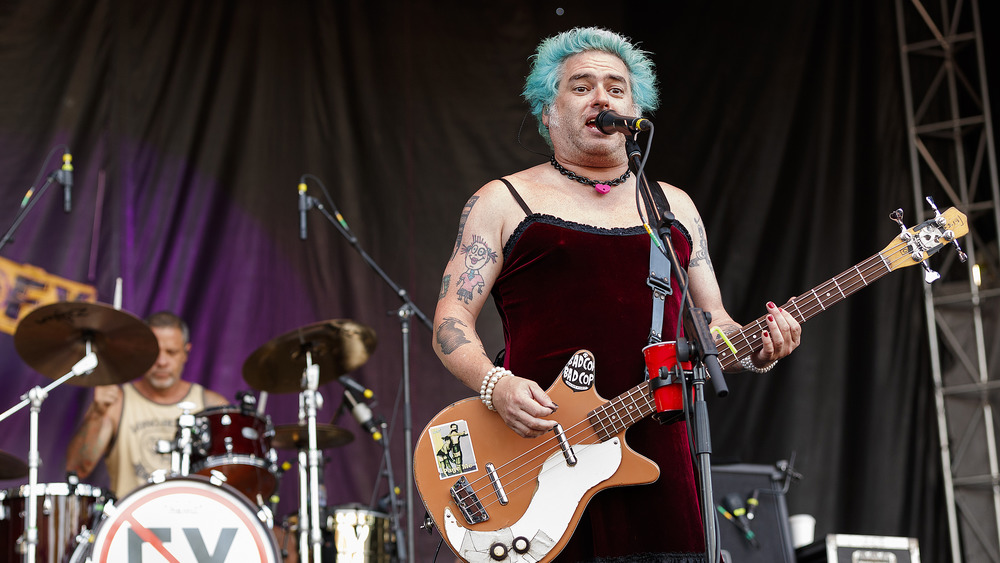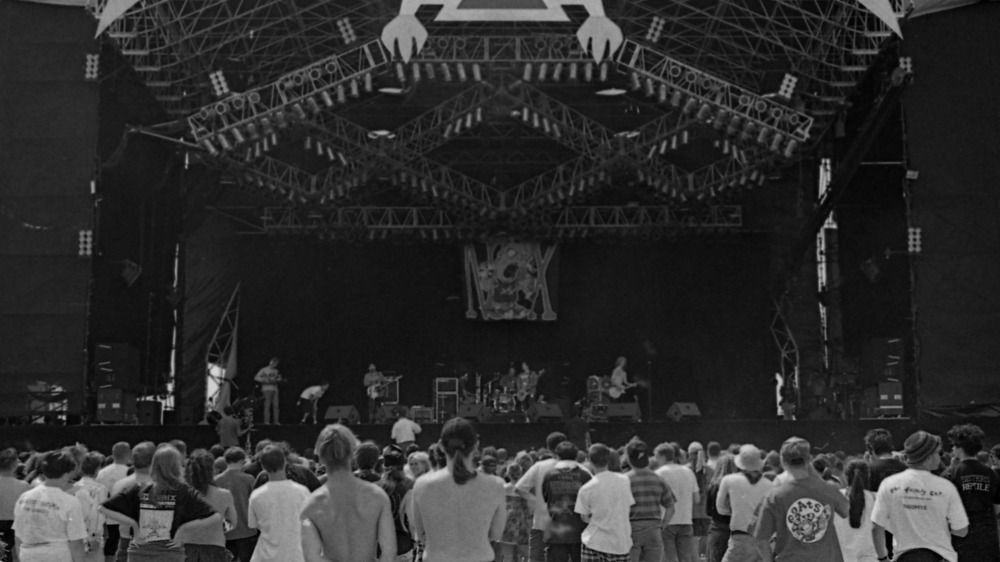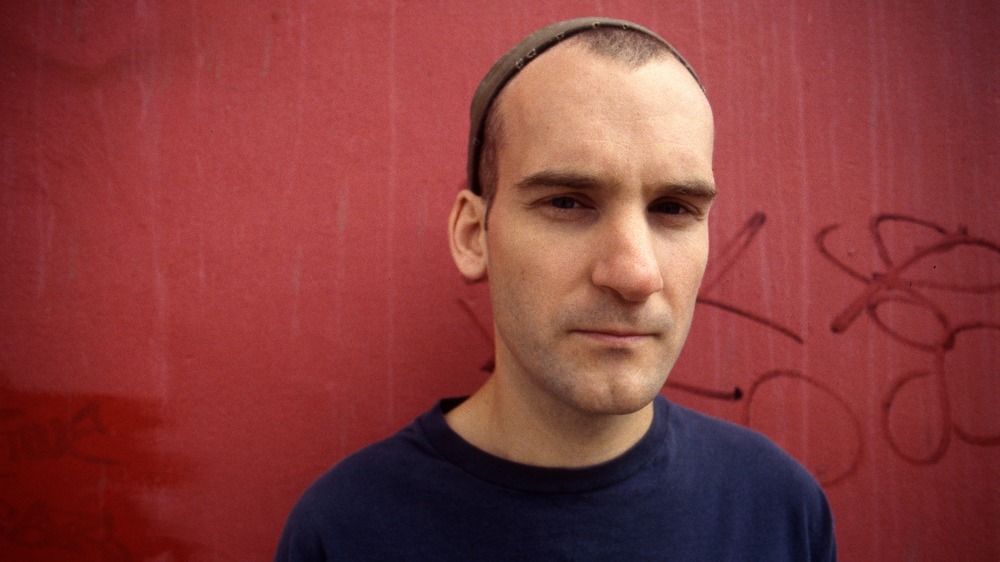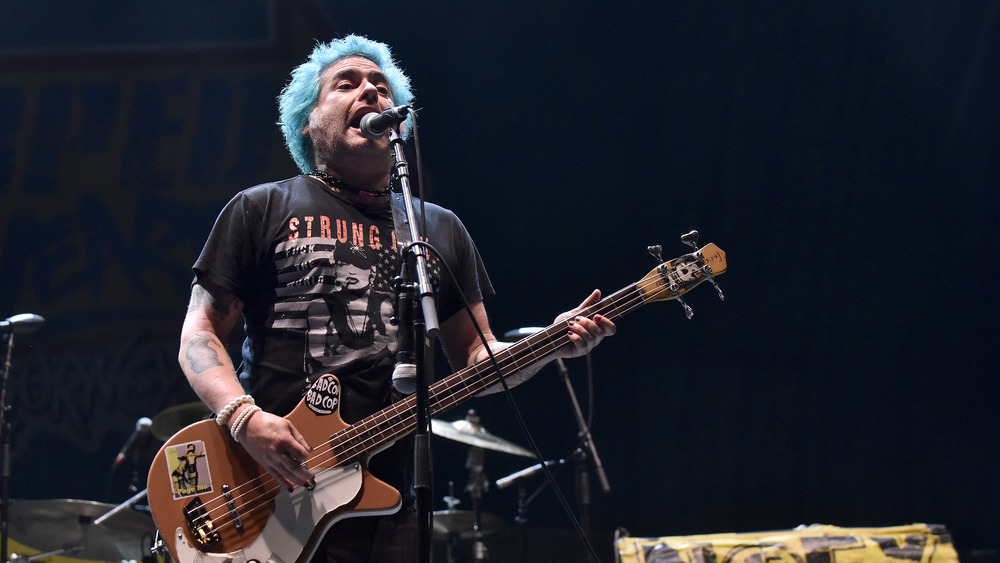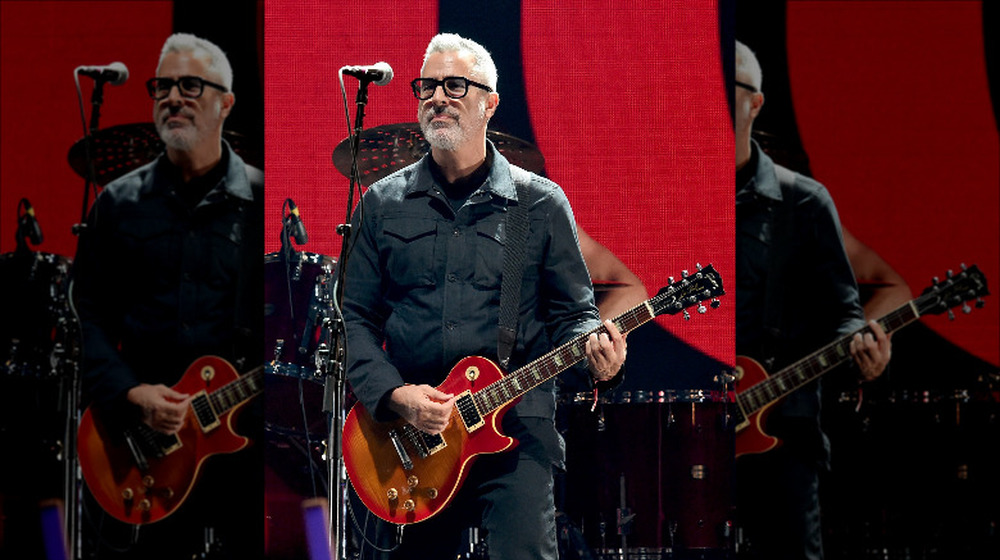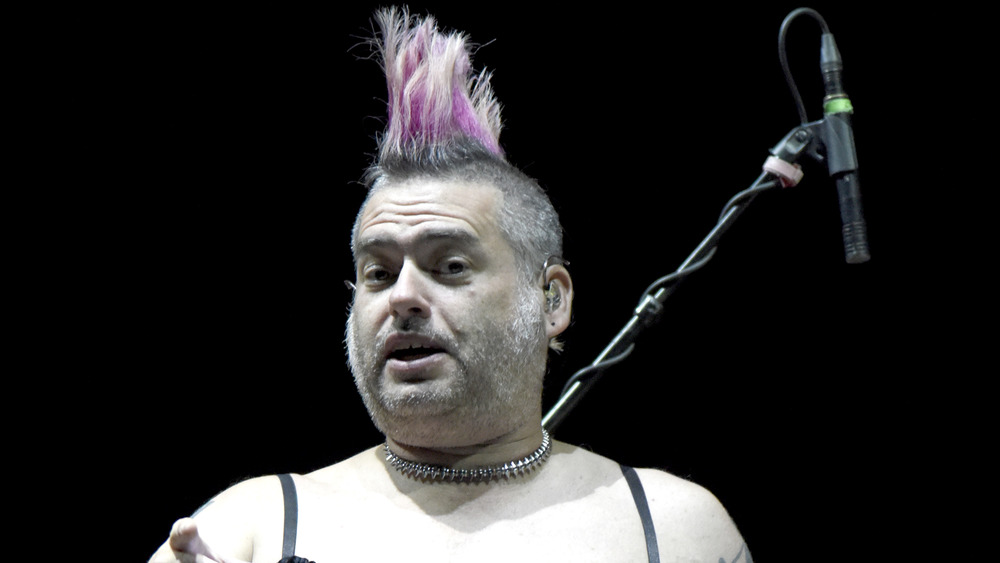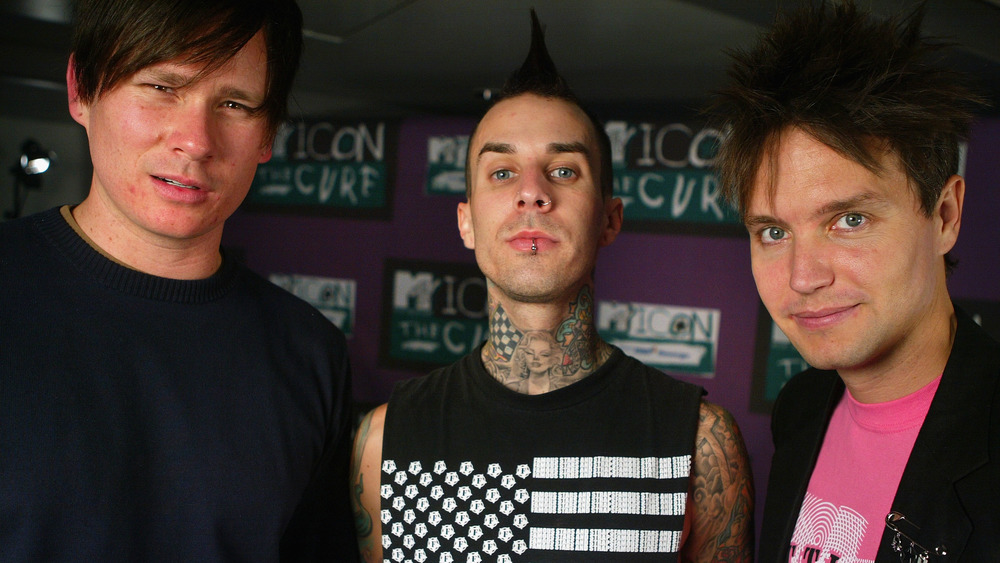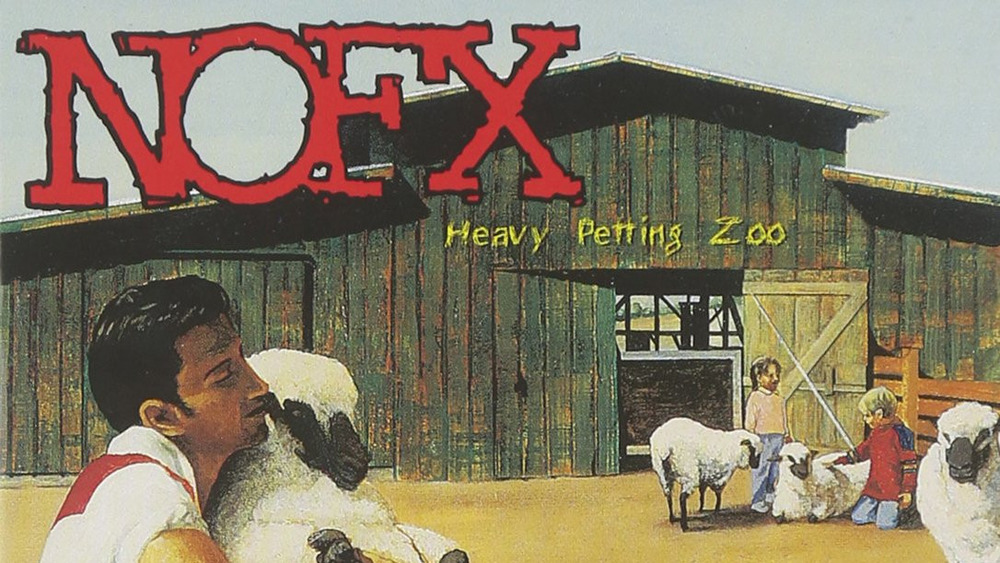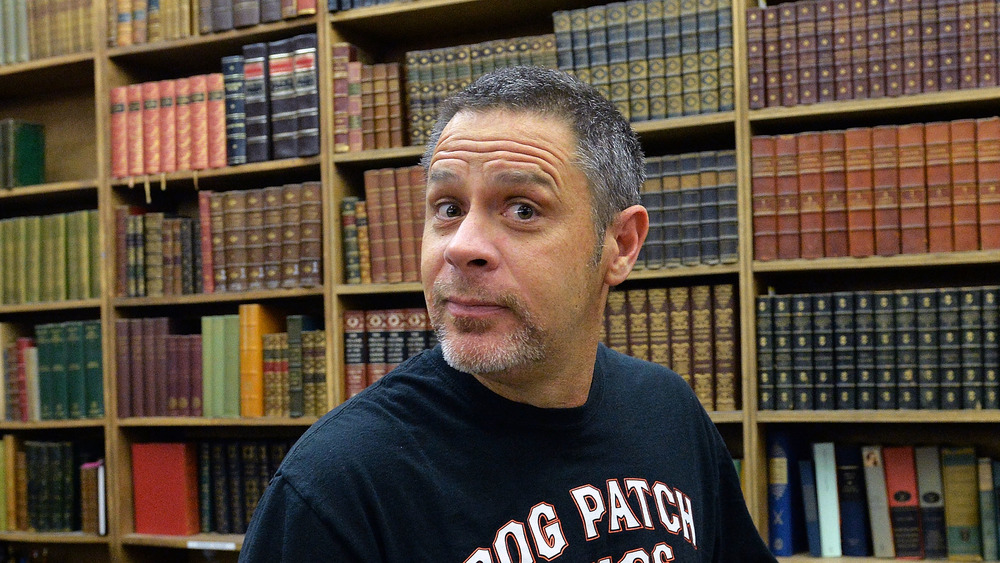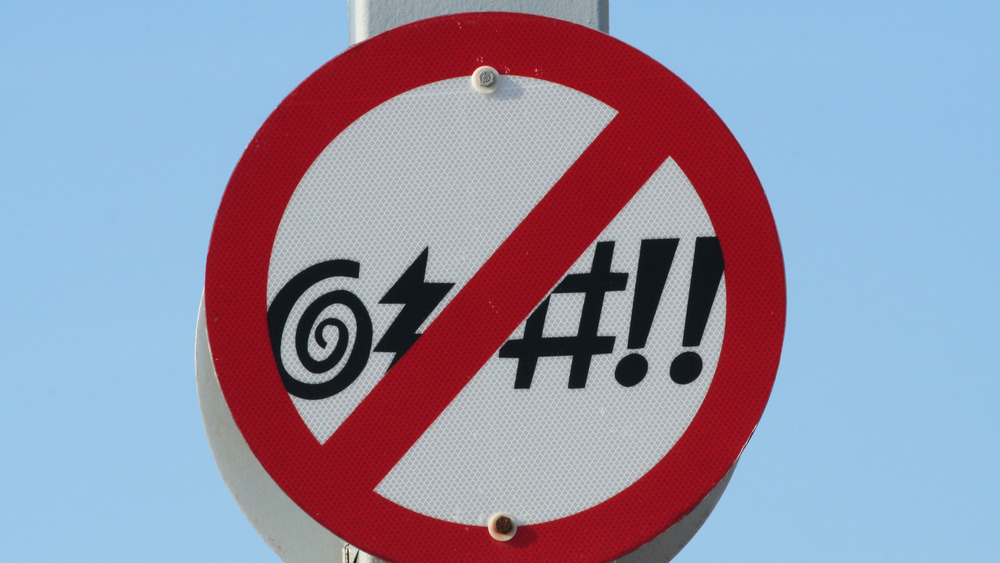The Untold Truth Of NOFX
For nearly 40 years, NOFX has been the most unlikely success story of punk rock music. Since their formation in 1983, the band has never signed with a major label, never had a Top 40 hit song, and never had a breakthrough to the mainstream. They've had serious struggles with drug abuse and other poor life decisions, their sense of humor remains locked in an adolescent mode, and their music remains defiantly stripped down (even if it is the somewhat rare punk music that regularly features trumpet solos). Their lead singer is called Fat Mike, even though he's arguably never been very fat, and they once thought releasing an 18-minute long song (1999's "The Decline") was a good idea.
Yet NOFX have released 13 albums, with a 14th on the way. They're considered to be broadly influential on platinum-selling bands like Blink-182 and Green Day. They've toured the world, sold millions of albums and singles and EPs, and even written a memoir. Where many of their contemporaries in the punk scene have faded away, NOFX remains a vibrant, working band. Yet despite being perhaps the greatest DIY success story in punk music, the band remains under the radar for a lot of music fans who are unaware of the wild, untold history of this legendary band. So here's the untold truth of NOFX.
NOFX thinks their early work is terrible
NOFX formed in 1983, and five years later they had an incredible opportunity when Brett Gurewitz, lead songwriter and guitarist for legendary punk band Bad Religion (and founder of music label Epitaph Records), offered to produce an album for them. As noted in their book, NOFX: The Hepatitis Bathtub and Other Stories, the band scraped up $675 to record the album, and Gurewitz offered to release it on Epitaph. But the band wanted to launch their own label.
Plus, NOFX themselves admit the album is awful. Lead singer Fat Mike considers the band's second album, 1989's S&M Airlines, to be their real first album and notes that NOFX was "sounding, performing and behaving like sh*t" prior to that. In fact, he says that the band had to rebuild their reputation from scratch with their second album because they had such a reputation for being terrible.
It's not just self-deprecation, either. Ron DePasquale at Allmusic.com says of the album, "the sound is very raw and loose; the lyrics are slightly humorous at best and sophomoric at worst" and speculates that the band just wasn't ready for the opportunity. After trying to sell the album on their own and failing miserably, NOFX sold the album to Epitaph after all, but it remains an album for dedicated fans only.
Three original members of NOFX were straight edge
Straight edge is a punk subculture whose members reject drugs, alcohol, and cigarettes. The movement took its name from the 1981 Minor Threat song (which NOFX hilariously transformed into a jazz song in 1992), written by Ian MacKaye. Straight edge has gone through several evolutions since its origins but remains a part of the punk scene.
You might think a band like NOFX, which as noted by The AV Club, has had a long history of addiction and substance abuse issues, would be as far from straight edge as could be. After all, as Vice reports, drug abuse has been a frequent subject of their lyrics, and they even wrote a song called "Six Years on Dope" that detailed everything substance abuse has cost them over the course of their careers. But that hasn't always been the case. As noted by Exclaim, three of the four original members of the band were straight edge at the time, with the exception being lead singer Fat Mike. Even Mike admits his serious drug abuse didn't begin until he was much older. The band is adamant that they were never an officially straight-edge band, but at the very beginning they were very, very close to being one.
The name NOFX doesn't mean anything
Band names often have a bit of mystery to them, and fans often want the meaning behind a name to be literal. There have been plenty of theories over the years about NOFX — some people think it's a statement about synthesizers and other artificial elements in music, an assurance that the band won't use any fancy "effects." That's partially true. The bands has stated that "there seemed to be a lot of gimmicky bands around ... we like to think that our name meant we were against that."
But the truth is a lot simpler. They stole it. As the band notes in their book, NOFX: The Hepatitis Bathtub and Other Stories, the band name was inspired by the band Negative FX, a Boston-based band that was part of the straight-edge scene. Negative FX didn't last long — they played a handful of shows and put out one album, then broke up. Since Negative FX had broken up so quickly, NOFX thought the riff on their band name would be a statement about their own longevity — which worked out great, since the band has been going strong for nearly four decades.
NOFX almost signed with a major label
NOFX is a band legendary for their indie success. They never signed with a major label, even in the 1990s when punk music broke through to the mainstream, driving bands like Green Day to multi-platinum status. They were signed to indie label Epitaph (co-founded by Bad Religion guitarist Brett Gurewitz) originally but jumped to lead singer Fat Mike's scrappy label, Fat Wreck Chords, in 2000.
They're an amazing DIY success story — as reported by Beat, lead singer Fat Mike brags that "we put out our own records, we do our own merch, we book our own tours and we do whatever we want. It's how it should be." But many don't realize they actually came really, really close to signing with a major label.
As the band itself notes in their memoir NOFX: The Hepatitis Bathtub and Other Stories, in the early 1990s, Hollywood Records contacted NOFX and set up a dinner to pitch them. Fat Mike says he was happy to take the meeting because he knew they'd get a fancy dinner out of it but also says the meeting was depressing. The Hollywood Records executives offered passive aggressive, backhanded compliments and heavily implied the band would go nowhere if they stayed on an indie label.
It turned out pretty well for the band. As Louder notes, they've gone on to sell more than 8 million records on their own.
Lead singer Fat Mike started his own label
Punk bands have a long history of creating their own music labels, because for a very long time major labels had little interest. As lead singer Fat Mike told Clevescene, in the 1980s a punk band that could sell 10,000 records was a massive success — but that translated into very little money. As he succinctly puts it, "In the '80s, nobody could make a living."
NOFX signed with indie label Epitaph Records, co-founded by Bad Religion's Brett Gurewitz, in the late 1980s and stayed with the label until the late 1990s, releasing many albums now considered NOFX classics. As noted by Consequence of Sound, in 1990, lead singer Fat Mike and his then-girlfriend Erin Burkett launched their own music label, Fat Wreck Chords. It was initially a hobby of sorts, and neither Burkett or Mike thought it would last two years.
Thirty years later, Fat Wreck Chords is a legendary label and a successful business, known for bands like Lagwagon, Against Me!, No Use for a Name — and NOFX. Yes, Fat Mike signed his own band away from Epitaph Records in 2000, and they've released their last six albums on the label.
One reason Fat Wreck Chords has been successful is their unusual business model. As writer Fletcher Smith notes, Fat Wreck Chords purposefully inks one album deals with their bands, which allows bands to start fresh and capitalize on their successes more nimbly — or leave the label if they're unhappy.
NOFX is incredibly influential
NOFX has been a fixture in the punk scene for more than 40 years. Over that time their sound has been refined — becoming more melodic and introducing more heavy metal-style guitar riffs — but the core identity of the band has remained remarkably steady. Their songs combine snarky humor and earworm melodies with tight, speedy punk guitar riffs, and they never take themselves too seriously.
So if you're a fan of breakout pop-punk acts like Green Day or Blink-182, you can thank NOFX for blazing a trail. In fact, the similarities between NOFX's style and Blink-182's music has been noted by the band itself — as Exclaim notes, guitarist Eric Melvin says of Blink-182, "We were always the joking band. We cornered the market on low brow humor."
But the influence of NOFX goes beyond stealing their humorous approach to punk rock. As Clevescene writes, NOFX is "the quintessential melodic hardcore band." While the band dislikes the term "pop punk" and prefers the phrase "melodic hardcore," there's little doubt that NOFX heavily influenced an entire generation of punk bands that have combined a pop sensibility with punk guitar crunch. NOFX is so influential, in fact, their music has been analyzed in respected scholarly journals like Musicology Australia.
There's a real Bob
One of NOFX's most famous songs is "Bob," from their 1992 album White Trash, Two Heebs, and a Bean. The song describes an alcoholic named Bob and begins with the classic lines, "He spent fifteen years getting loaded / Fifteen years 'till his liver exploded / Now what's Bob gonna do now that he can't drink?"
There have been many theories about the song, ranging from speculation that "Bob" is actually one of the band members to Bob being a composite of several characters who attended NOFX shows in the early years. According to New Noise Magazine, however, Bob was a very real and very specific person named Bob Lush, a homeless Korean man who hung out with the band and attended their shows.
As detailed in their memoir, NOFX: The Hepatitis Bathtub and Other Stories, Bob was a heavy drinker. One day he got into a fight with his girlfriend, and she threw him into a weight bench — and Bob's damaged liver literally burst. He survived (barely), and the incident served as inspiration for the song — though many of the lyrics are fictionalized. The band never got to find out what Bob thought of it, though. He died of an overdose shortly afterwards.
A NOFX album cover got banned
NOFX has never shied away from controversy. Their song lyrics openly — and often humorously — discuss racism, BDSM, and drug use, and they revel in describing the often hilariously gross aspects of their lives (although Fat Mike told Louder that he regretted writing openly about his experiences with venereal diseases).
But for a band that courts controversy, their album covers have been largely restrained affairs — with the exception of 1996's Heavy Petting Zoo. As NME reports, the cover was designed by lead singer Fat Mike and created by artist Mark DeSalvo and depicts a man having relations with a sheep (there are two versions — the slightly tamer CD cover and a much worse vinyl version with the alternative title "Eating Lamb"). Fat Mike knew such a cover would be controversial, telling NME, "It was our first record after punk broke in 1994, so while everyone was commercializing, we put out something to hurt record sales."
The cover was, as predicted, controversial — and probably did hurt sales. According to Mike, a store was shut down in France when it put the poster in its window, and uDiscover notes that the album was banned in Germany as a result.
Drummer Erik Sandin's heroin habit was outed by Rolling Stone
It's no secret that the members of NOFX have always been very, very fond of their illegal substances. The band has been very open about their drug use, writing songs celebrating their experiences, including the hilariously literal "Drugs are Good" — and as Vice reports, more recently, songs celebrating sobriety. As the AV Club notes, the band's history of drug abuse and addiction goes back decades.
Drummer Erik Sandin's heroin addiction led to two contentious moments in his career. According to the band's memoir, NOFX: The Hepatitis Bathtub and Other Stories, when the band was gearing up to record their 1992 album White Trash, Two Heebs and a Bean, he was confronted by lead singer Fat Mike and told he had to either enter rehab or quit the band, prompting Sandin to finally kick the habit.
But as Exclaim reports, heroin had one more trick to play on Sandin. A freelance photographer working for Rolling Stone contacted him while he was still using the drug and offered to pay him $350 for a photo of him injecting heroin. Sandin says he specifically requested they not show his face — but when the photo published his face was clearly visible — which is how his mother learned he was a drug addict.
Fat Mike was addicted to Oxycontin
As noted by The AV Club, NOFX's lead singer Fat Mike is a rare musician who increased his drug use and grew wilder as he got older. Most rockers go wild in their youth, then sober up in middle age when their bodies can't take it any more, but Mike actually seemed to lean into his demons as he hit his 40s and 50s.
The singer is sober today but not after getting ensnared in the same drug epidemic sweeping the rest of the country — legal pharmaceuticals.
As The Observer reports, Mike didn't start doing drugs until he was in his 30s, starting with Vicodin and Percoset — and cocaine. He would use while touring with the band, but when he came home he would try to sober up so he could run his business interests. He discovered that he couldn't quite stop taking Oxycontin. Even though he was on a relatively low dose, he would feel sick if he stopped taking them.
Then a doctor recommended he undergo a three-month program using Suboxone, a drug designed to help people kick their Oxy habits. He quickly found himself just as addicted to Suboxone. He had to enter a rehab in order to kick the habit for good.
NOFX pranked radio programmers
NOFX has never had any illusions about mainstream success — in fact, they've been defiantly disinterested in it and openly mocked the mainstream record industry. That attitude reached a peak with the release of their 1992 song "Please Play This Song on the Radio" on their album White Trash, Two Heebs, and a Bean.
The song is a fast-paced, catchy punk song that seems to be harmlessly mocking the way some bands lust after radio airplay and mainstream success: "We wrote this song / It's not too short, it's not too long / It's got back-up vocals in just the right places." The song also includes some fun purposeful mistakes when the band sings about their technical competence, implying that everyone is in on the joke here.
But as LiveXLive notes, the melodic nature of the song and the harmlessly jokey lyrics that the song features for one minute and 45 seconds is all a set-up. After a false ending, there's a sudden encore filled with obscenities designed to ruin any unsuspecting radio programmer's day. Fat Mike delights in imagining the fines the radio station will have to pay the Federal Communications Commission, and the song closes with the refrain, "You can't play this song on the radio."
NOFX has been banned in the USA
When you're a punk band known for being controversial and irreverent, it's easy to think you can get away with anything. NOFX have written songs celebrating drug abuse, they've mocked other bands for being sellouts, they've used offensive images for album covers — and gotten away with it. But in the wake of the 2017 shooting at the Route 91 Harvest music festival in Las Vegas, they finally went too far.
As NME reports, a few months after this horrifying crime which left 58 people dead and more than 500 injured, NOFX thought it would be a good idea to crack jokes about it onstage, including saying "At least they were country fans and not punk rock fans." The backlash was fast and furious. As KXRB reports, NOFX found all of their upcoming concerts in the United States were canceled. They also lost their sponsor, Stone Brewing, which dropped the band like a hot rock in the wake of the controversy.
The band admits it made a terrible mistake. As Billboard reports, in a rare move, NOFX issued an official apology, writing, "There's no place here to backpedal. What NOFX said in Vegas was shameful. We crossed the line of civility. All members of the band would like to sincerely apologize."
The apology must have worked, because as of 2020 NOFX was back on tour and working on their 14th album.
